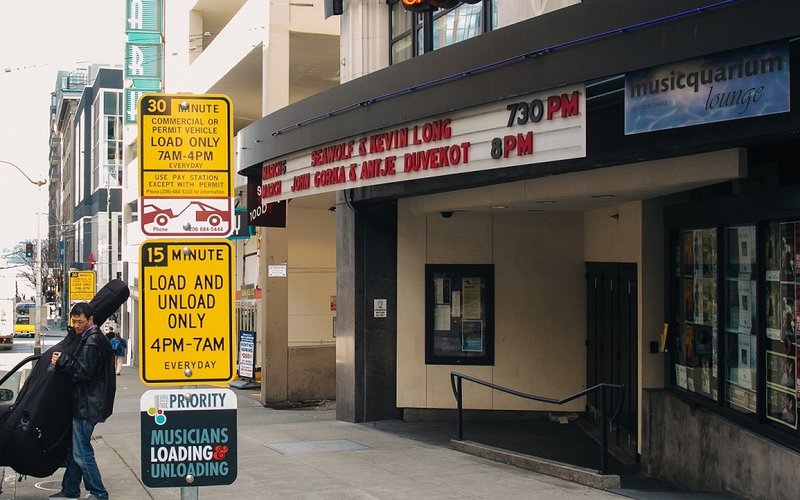
This piece originally aired as a feature on KEXP's radio show Sound & Vision. Revisit the audio in our archive.
Fair Trade Music is a grassroots campaign working to raise the living wage of Seattle musicians and create more transparency in the local music industry.
“We are pretty focused on the issue that, in a city that calls itself the city of music, the musician workers themselves are drastically underpaid compared to some other fields of work,” says Nate Omdal, an upright bassist who’s a part of Fair Trade Music.
Omdal says that the primary goal of the organization is to increase pay for musicians. But not all of the group’s projects are directly financial. The group was responsible for the musician loading zones that are in front of KEXP, The Crocodile, The Showbox, and more. They’re dedicated area in front of the venue for musicians to load and unload their gear without having to scramble for parking or have to lug their stuff from blocks away.
Another initiative of the group is to create more transparency in cover charges at venues, which are difficult to track.
"When you go to a rock club and participate, you're not given a paper receipt. Your hand is stamped with a rubber stamp and you're allowed to enter," says Omdal. Fair Trade Music is working to get clubs to sign a transparency agreement so artists know how much money they're bringing in and can be paid fairly.
Sound & Vision host Emily Fox spoke with Omdal about Fair Trade Music’s goals and how the COVID-19 pandemic is showing the need for more transparency in the music industry.
[It] is the practice where an employer will say to a band, because you're doing work at our venue or our festival, you can't find another gig in radius X, for duration Y. And that was a pretty common practice in the music industry. And we passed HB 1450 last May, which made non competes unenforceable in the state of Washington for any worker that's not earning more than $100,000 as a W2 worker annually or $250,000 annually as a contract worker. Which means that for a music festival band that is getting $500 for one hour of work to split between however many band members are in their ensemble. The festival can no longer tell them you can't work for the rest of the summer because you chose to do one hour of work for our business.
And that amounted to: you'll provide some paperwork around the money, you'll have a safe stage, you'll have venue manager, someone in charge while we're there. And there will be somebody after the fact that we can settle up with if there's a problem. That was really all we asked for. And when we approached most venues, they were all very amicable to agreeing to that.
We need to start collecting the hours and documenting who's doing the work in the nightlife industry in a more detailed way, because we just had a pretty clear example of the problems that the workers face without that information and without that safety net and without that information being held and kept and guarded.
Jackie Shane was a Black trans soul singer who performed in the 60s. In 1971, she walked away from her career and basically disappeared.
Gabriel Teodros talks with musician, poet, attorney, and former mayoral candidate Nikkita Oliver on the protests and social justice movement in Seattle.
Sound & Vision host Emily Fox spoke with King County Executive Dow Constantine about the county’s choice to include private venues in a $60 million relief package.